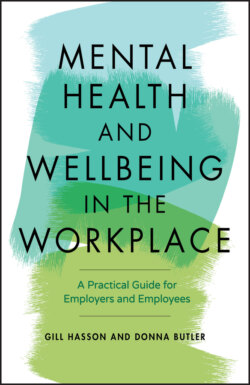Читать книгу Mental Health and Wellbeing in the Workplace - Gill Hasson - Страница 16
Recognizing and Understanding Specific Mental Health Problems
ОглавлениеStigma and lack of awareness surrounding the spectrum of mental health problems can mean that people are often not aware of the symptoms of even some of the most common disorders like depression and anxiety. A person can be struggling but they, their friends, family, colleagues etc. may not recognize that they have a mental health problem. This can mean the issue doesn't get talked about, support and treatment are not sought, and things can go from bad to worse.
Of course, just as one person can experience a physical health problem differently from the next person, one person can experience a mental health problem differently from someone else with a mental health problem. There are, however, some common signs and symptoms. They include any number of the following:
Out-of-character behaviour/unusual reactions
Being overly sensitive, often upset or tearful, perhaps unable to stop crying
Sudden mood changes
Aggressive behaviour, irrational, angry outbursts
Withdrawing from others
Persistent tiredness or exhaustion
Sleep problems
Difficulty communicating, thinking clearly, concentrating, remembering, or making decisions
Changes in appetite and eating habits
Using alcohol or drugs as a coping strategy
Losing interest in sex or being dependent on it
Neglecting appearance and personal hygiene
Taking less interest in things that used to be enjoyable
Reluctance to make plans
Physical aches and pains, nausea, tremors
Self-harm, suicidal thinking or behaviour.
Although these are common indicators of a mental health problem (and/or could also be symptoms of a physical illness) each mental health problem will have its own specific signs and symptoms.
